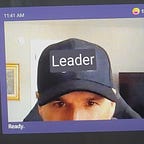The roots of leadership — awareness
The root of honesty is awareness.
What if told you that your thoughts are not a reliable source of data.
Most leaders I’ve met, pride themselves on being rationale decision-makers. But our cognitive bias and limited, mental bandwidth makes belief in our innate ability to consume information and reach the right conclusions, well, pretty irrational.
So let’s pretend you agree with me so far and you are now ready to embark on the journey of being a better, irrational decision-maker. And let’s pretend this is a good thing because now you are aware of your limitations.
And with this recognition you have opened the door to awareness.
Using awareness as a leader means slowing down and:
- Recognizing that your mind is conserving resources by offering a response that seems to fit based on matching data passed through your mental filters and past experience.
- Noticing how you feel in your body and accepting that the emotional and physical stimulation may be coming from sources completely unrelated to what is happening in this moment or the problem that you are trying to address.
- Observing the context you find yourself in and the energy that is present and the feedback you are hearing and seeing in the people around you.
Those steps might sound complicated so here’s a simple version:
- SLOW DOWN
- PAY ATTENTION
- BE CURIOUS
The act of paying attention is a real challenge in today’s world. We’re pushed to move fast, act decisively, prove our competence, and get on to the next thing as quickly as possible. (or back to some pleasant distraction).
What does this have to do with honesty?
When we aren’t really paying attention to what we are thinking and how we are feeling, we are prone to acting in ways that are dishonest. By that I mean, ways that are not in line with our intentions, values or in the best interest of the individual, team or organization.
Awareness creates the opportunity for you to apply new filters — to consider your motives — to ask better questions. This in turn helps you respond proactively based on what you really want and who you want to be, not what feels good or most expedient in the moment.
Practice pausing, listening, noticing — internal and external signals.
Ask questions, say what you see and what you feel, collect this feedback from others.
It will feel awkward to pay attention when there is pressure to act.
The more you practice, the more natural it will feel.
You will be able to take on more and better decisions.
You are less likely to act in ways you regret or that hurt your integrity.
Go slow to go fast.
If you’d like to learn more about my work or how I might be able to assist you in your leadership journey through a personal and practical coaching experience please contact me here.
